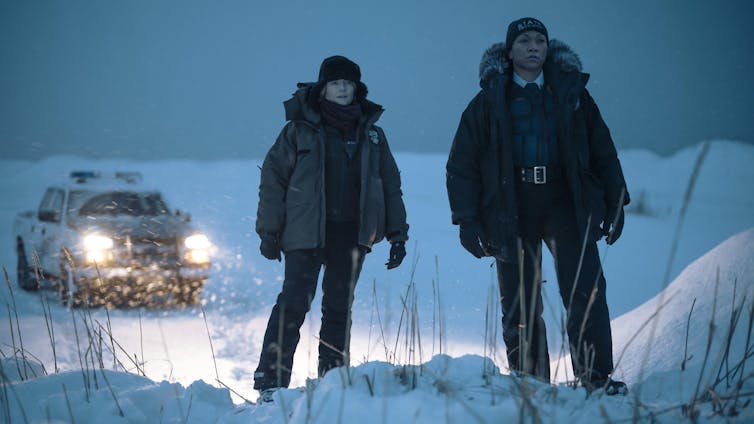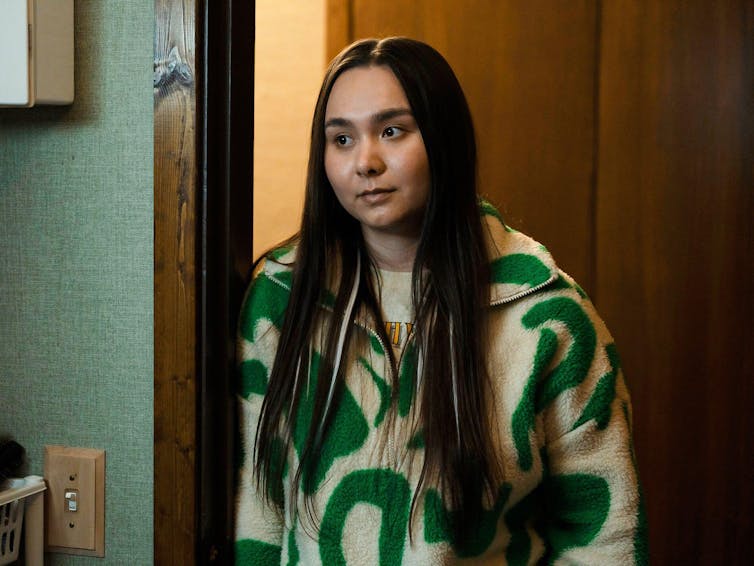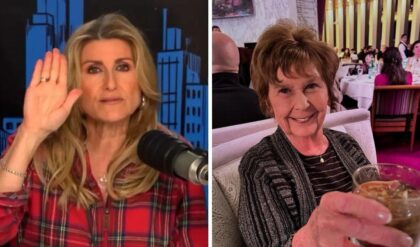True Detective: Night Country, the fourth season of the HBO/Sky drama, is a twist on its familiar neo-noir mystery format, starring Jodie Foster and Kali Reis as the lead detectives. It’s the first time women have been at the show’s helm.
The season is set in Ennis, a fictional mining town in Alaska, during a polar night. The local indigenous community, Iñupiat, (a real group of indigenous Alaskans) have formed families and social ties with incomers over the years, but their coexistence is not without hurdles.
The investigation of the disappearance of a group of scientists from a local research lab brings to the fore a forgotten case of the murder of an indigenous woman.
The appeal of indigenous life
Cinematic descriptions of indigenous communities are usually the domain of documentary films. But in recent years, more fictional films and television shows have included indigenous motifs. For example, the acclaimed films The Wind Journeys (2009) and The Embrace of the Serpent (2015), are both directed by Ciro Guerra.
Films and television shows that depict indigenous characters and cultures risk overly relying on stereotypes or exaggerations for the sake of narrative. These result in inaccurate depictions of indigenous life.
Part of the appeal of seeing indigenous life represented on screen is the western viewer’s longing for discovering a “forgotten spirituality” which could remedy the worries of contemporary life. But characters in True Detective: Night Country often mock or disregard indigenous viewpoints.
The main investigator, Liz (Foster), constantly sneers at her detective partner, native Iñupiat state trooper Evangeline (Reis), about her “spirit animal” giving her clues.

Jodie Foster and Kali Reis in True Detective: Night Country. FlixPix/Alamy Stock Photo
Evangeline, in turn, resents the dismissal of the historic investigation of the brutal murder of Annie, a native Iñupiat woman. She claims that only the disappearances of “white boys” seem to matter. Evangeline sees the removal of Annie’s tongue as a symbol of “silencing the indigenous voice”.
At the bottom of the matter lies the question of land ownership (“We were here before”, indigenous activists shout in one scene) and environment protection – two things most indigenous communities across the world have in common. The two groups inhabiting Ennis distrust each other and do things behind each other’s back, although their lives are inevitably entangled.
Although the story and location are fictional, the Iñupiat are a real community of Alaska (“Iñupiat” actually means “real people”).
The politics of indigenous representation
Indigenous communities on screen often serve the function of the “other”. This means they effectively help to define the identity of the non-indigenous protagonists and audiences by showing what they are not.
This “otherness” focuses on their differences, and it often follows the stereotype of an unrefined victim lacking the benefits of civilisation or a “noble savage” holding forgotten secrets to lost spirituality.
The often mysterious symbolism of indigenous culture is used to convey the fear of the unknown. Anna Lambe, an Inuk actress who is part of the True Detective cast, says that representations of indigenous life are frequently inaccurate and deeply grounded in stereotypes. True Detective contrasts local traditions with western law enforcement and science – although the solution comes from marrying the two.

Decolonising the screen
In 2012 the Berlin International Film Festival introduced a “NATIVe” section for indigenous filmmakers. The section allowed indigenous cinema (both fiction and non-fiction) to be part of a large international film festival. The initiative was a breakthrough, offering a high profile opportunity to screen indigenous issues. Unfortunately the section was discontinued in 2019, having not been hugely attended.
My own filmmaking projects, first with the Yanesha community from the Peruvian Amazon and then with the Arhuaco from Colombia, taught me something crucial: that my vision of their ways of life is just my interpretation, filtered through years of preconceptions about indigenous peoples.
Watching these indigenous peoples’ own films showed me not only who they really are, but also what they think about western filmmakers who think they know how to represent them.

What I am impatiently waiting for is to see more indigenous filmmakers making their own representation of their culture. After all, showing a couple of animal skins or native face tattoos is not enough to claim we have decolonised television and cinema.
But True Detective offers a nuanced portrays of the Iñupiat. They are not “bad” nor they are “good” – they are ordinary people just like everyone else, with their own problems and valuable heritage. The show’s creators have gone beyond cheap and overused stereotypes to allow for a more realistic depiction of contemporary indigenous lives: one which is not trapped in the past but still benefits from traditional values. Let’s hope this trend continues so that we see more representations of diversity across film and television.


